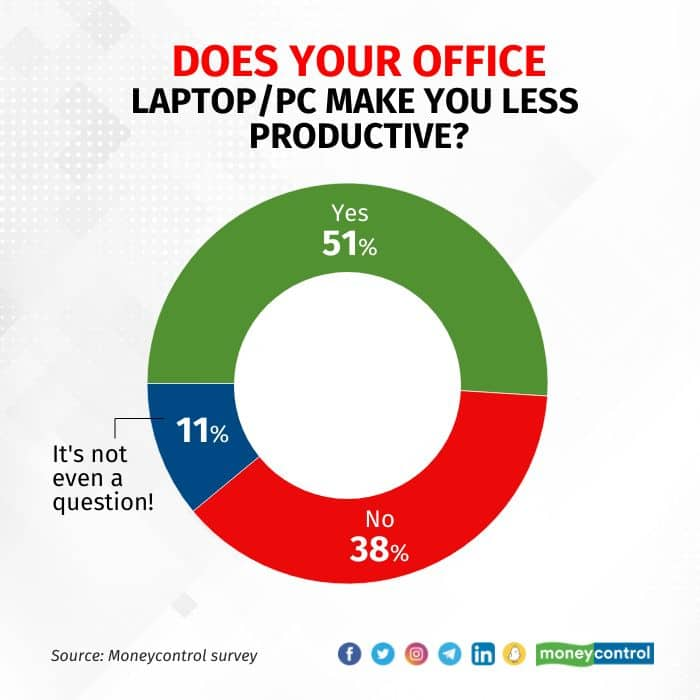



“It has hung again” is an often-heard comment, spoken aloud by professionals about their office laptops and desktop personal computers. The general perception among professionals is that office machines are not so great.
When Moneycontrol asked over 2,000 professionals if their work laptops make them less productive, 51 percent replied in the affirmative and 11 percent said it was a moot question because work laptops are naturally underperforming. Only 38 percent said they didn’t have an issue with their work systems.
Business data and analytics provider Dun & Bradstreet estimates that 59 percent of Fortune 500 companies experience at least 1.6 hours of computer downtime every week.
Business Computer World calculates that if a company has 10,000 employees who are paid $56 per hour on average, the labour element of downtime costs alone would be $896,000 weekly.
Grusha Khanna, a marketing professional with over four-year experience, has observed that office laptops are usually the old ones that are no longer available in the market.
“…working on old laptops leads to slow processing of work,” said Khanna, who believes that a decent model of laptops must be provided to employees so they don't make excuses for work delays.

International Business Machines Corp found that 35 percent of IT directors reported unplanned downtime in their organisation monthly. This type of downtime occurs when there is an unexpected shutdown or failure of equipment or processes.
Denying in jest that work laptops reduce productivity, Manoj Kumar, an IT Business Analyst, said: “Instead, they give you time to relax.”
Work computers come with a specific purpose
Office laptops are bought on the basis of the requirements of a business. They are supposed to be compatible with IT admin hardware and software, security compliance and standardisation across different users and teams because too much dissimilarity will increase conflict and maintenance costs, and finally, the overall cost of ownership, explains Nikunj Verma, founder & CEO of Cutshort, a tech-hiring platform.
“While employees as consumers are looking for maximum performance and social value as a result, they find office laptops to be ‘not so great’,” Verma said.
Large organisations (with more than 2,000 employees) don’t have such problems because they are not into saving money. Small companies usually compromise on quality and buy in bulk to save money, says Sharan Gudipati, a talent acquisition specialist with 15 years of experience.
Generally, companies divide their organisation into three major teams: operations, sales and support. Support functions including Human Resources (HR) and admin and don’t get high-end laptops because their roles are believed to be “less technical,” he added.

High-end laptops are provided based on an employee’s designation, such as assistant vice president and above, and those with a managerial role would get mid-spec laptops.
Employees below the managerial level may or may not get laptops and may have to make do with standalone PCs, Gudipati said, adding: “This way effective cost control is managed.”
A perception is created that because every laptop has its limitations, if you use a device beyond what it is designed for, it will start misbehaving, said Abishek Vyas, founder & CEO of marketing agency My Haul Store.
“Use it in accordance with the capacity of your gadget,” Vyas said.
Multiple computing devices
Until the last two-three years, employees used to have only one computing device at home. They would install a lot of software like games, children’s learning apps, media players and so on to do many things.
“But now, with many computing devices per household, smartphones and smart TVs and also with the whole shift towards cloud software that needs no installation, the impact on laptop performance is on the decline,” said Verma of Cutshort.
In 2020, antivirus software vendor Malwarebytes found that 53 percent of employees used office work laptops to send or receive personal email, 38 percent shopped online, 25 percent accessed their social media and 22 percent downloaded or installed non-company software.
One reason for the ‘not so great’ laptop perception could be that employees feel they are not getting the best performance out of their device because they are not physically present in the office, having been confined to work from home during the pandemic, experts say.
In reality, says Bangaru Babu, vice president of IT infrastructure at Omega Healthcare, the assets being procured and provided to all employees are always of good quality because the organisation's reputation is at stake.
“Employees can complete certain basic healthy practices like shutting down their systems after their work, which helps release temporary files and clear the swap space of the memory,” Babu suggests.
Also, Babu says, computers should not be used in high temperatures and proper cooling systems should be available for the devices for users to derive maximum value out of the assets.
Discover the latest Business News, Sensex, and Nifty updates. Obtain Personal Finance insights, tax queries, and expert opinions on Moneycontrol or download the Moneycontrol App to stay updated!
Find the best of Al News in one place, specially curated for you every weekend.
Stay on top of the latest tech trends and biggest startup news.